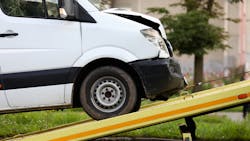How to maximize uptime after a collision
Vehicle collisions are an unfortunate reality. Between the cost of repairs, downtime, and potential missed revenue opportunities, the average cost of a commercial vehicle accident is estimated at $21,000.
So, what can do you to streamline the post-collision process?
What to do immediately after a collision
First, let’s quickly review the steps drivers should take immediately after an accident.
- Get to safety and dial 911. Safety is the first priority. Even if the accident is minor and there are no injuries, the driver (or a passenger or bystander) should call 911. This is an important step that may even be required in some states.
- Document everything. The driver should obtain the following information from others involved in the accident:
- Names and contact information for all drivers and passengers
- Driver’s license numbers
- Vehicle descriptions and license plate numbers
- Insurance company information (including policy numbers)
- Eyewitness information
- Police officer’s name and badge number
- Location of the accident
- Pictures of the damage and all vehicles involved
- Don’t admit fault. It’s important for drivers to remember that it’s up to the insurance company to determine fault.
- Wait for assistance. The driver should pull over to a safe location (if possible), turn off the vehicle, and turn on the hazards.
- Notify the employer and insurance company. A claim should be filed immediately.
Your fleet vehicle needs to be repaired. Now what?
Repairs are common after a collision, and sometimes you won’t know the full extent of the damage until your vehicle has been properly examined. Here are the next steps to take:
- Find a reputable body shop. Your insurance company may offer a list of preferred shops, but you aren’t required to follow their suggestions. You can choose an auto body collision repair shop that you’ve done business with before, or you can find one that’s in your area. Either way, it’s important that the body shop can offer a lifetime warranty for all repairs. You also want to look for one with I-CAR certified technicians.
- Receive a free estimate. A good body shop will be able to provide you with a complimentary estimate. Sometimes it’s impossible to know all of the damage until repairs begin, but this is still an important step. Plus, the body shop should be able to review possible scenarios with you—including potential costs.
- Bring all your documentation with you. When you’re working with a repair shop, it’s important to be prepared. This includes having the appropriate documentation with you, such as your insurance policy number, claim number, etc.
- Review the timeline for repair. In some cases, repairs need to be done as soon as possible, especially if the vehicle cannot be driven otherwise. Anything to do with brakes, steering, oil, timing belts, and water pumps should also be addressed immediately. Some repairs, however, can wait, such as minor fender damage, dents, or paint damage. It’s best, however, to discuss this with your auto body shop.
Tips to streamline the process
- Keep up with preventative maintenance. Even though collision repair isn’t predictable, routine fleet maintenance is. For example, if you obtain regular oil changes and routinely check your brakes, you shouldn’t face any surprises when it comes to these areas in the collision repair shop (unless, of course, there is damage to them). If you’ve put off oil changes or repairing your breaks, you could be faced with even more damage that will only add money and time to a potentially frustrating situation.
- Find a body shop before you need one. We already mentioned that you should find a reputable body shop, but you can streamline the process if you find one before you (hopefully never) need one.
- Remember, communication is key. Good communication between you, the insurance company, and the auto repair shop is essential to a successful collision repair. Expectations should be set early, and don’t be afraid to ask questions. A good insurance company and collision repair shop should keep you updated throughout the entire process and be happy to answer your questions.
Information provided by: Key Auto Group
About the author: John C. Stolz oversees the management of seven collision centers in two states with $28 million in revenue. Day-to-day he develops business plans and budgets to meet the financial targets for the company while forecasting for industry changes and trends. Stolz also ensures that day-to-day operations run smoothly and are supported by the Key Auto Group as a whole.
